[Interview] Inside the new big business of Chinese weddings
East meets West cultural blends at the forefront of Chinese weddings

Cyrielle Mohara, French founder of the Asian-based Spectrum Agency.
For Cyrielle Mohara, the founder of Spectrum Agency, a luxury international events and wedding planning agency in Shanghai, the Chinese wedding industry has been undergoing a major transformation in the last five years. Factors like increasing socioeconomic levels and, as David Ho asserts in China Daily, the legacy of the one-child policy, are now allowing Chinese families to spend incredible sums on their children’s’ weddings. As young members of the rising middle and upper classes in China are increasingly enjoying the staples of foreign lifestyles, their penchant for Western-styled weddings is also growing. According to “Chinese Wedding Status Survey in 2017”(2017中国人婚礼状况调研报告)conducted by Chinese matchmaker agency Baihe Website百合网, western-style weddings and birthday ceremonies are becoming very popular in China. 63.8% Chinese women now prefer western-style or a Chinese-Western mixed style of weddings.
“The young couples coming to us also want a more western style wedding, which they often see as more relaxed, and fun. They want their guests to enjoy the wedding” she said. “The decor and ceremony are more European style, as couples are looking for a more elegant and chic design.” In the Chinese weddings industry, the use of Western aesthetics in events is often associated with wealth and high social status. For example, macarons, symbol of premium western desserts, fulfill an increasingly important role in these ceremonies. But according to Cyrielle, traditional Chinese customs are just as important as displays of opulence. “Most clients will want to integrate some Chinese customs to their weddings such as door games and tea ceremonies” she said.
While this trend of East-West inspired weddings is growing, many young couples also have the costs to contend with. In an industry now worth over $25 billion, over 50% of couples use wedding planning services, according to IBISWorld. Many of the expenses go to lavish photo shoots, often in foreign countries and with many outfits. However, as the thinking goes in China, spending the extra money for one special day is worth a lifetime of happiness.
Daxue Consulting recently caught up with Cyrielle Mohara to glean some insights into her business and the growth of the Chinese weddings industry.
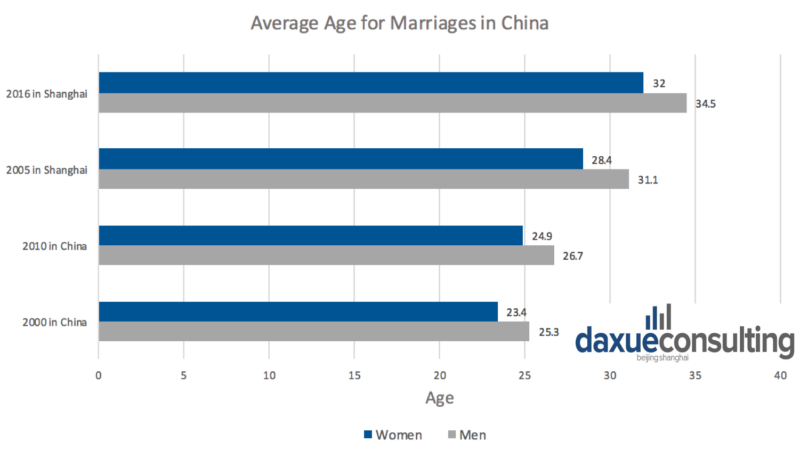
Despite new wealth among young Chinese couples, average marriage ages increased in Tier cities like Shanghai, while the national average remained more stable. Reproduced by Daxue Consulting with data from The National Population Census and Shanghai Civil Affairs Bureau.
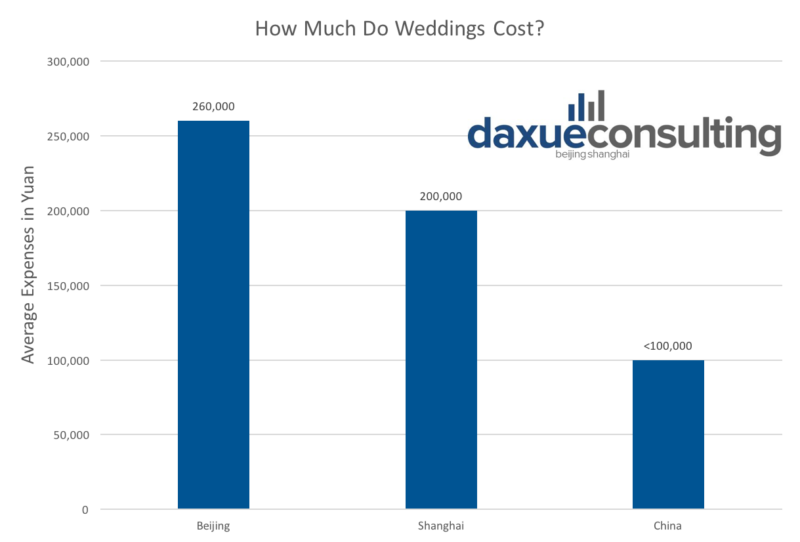
Increasing ages and high urban incomes are contributing to the trend, with Tier 1 cities like Shanghai and Beijing leading the change. Reproduced by Daxue Consulting with data from The National Population Census and Shanghai Civil Affairs Bureau.
Chinese wedding traditions and customs vary from region to region. Most wedding firms choose to focus on one city or province. Why did you specifically choose Shanghai?
Cyrielle Mohara: “I’ve been living in China for eight years, but we started the company about two years ago [2015]. Shanghai is a great base as it is very international and everything can be found here. Budgets are also usually higher in Shanghai. Our clients are mostly based in Shanghai but if they would plan their wedding anywhere else in China or abroad, we of course adjust to their requests accordingly. We have already planned weddings in Hangzhou, Ningbo, Sanya, and abroad in France, Bali, Thailand and the Philippines.
Experts estimate the Chinese wedding industry will be worth 400 billion dollars by 2020. With 2017 considered a lucky “double spring” year, how is it shaping up for you thus far, and do you expect an increase in business compared to past years?
Mohara: 2017 has been a good year for us thus far, especially as we are one of the more recent players in the Chinese market. Usually, your presence takes a bit of time to develop as it is mostly through word of mouth and recommendations, but we are growing, and I do believe next year will be even bigger and better. The wedding market is constantly growing in China, and we are now planning more destination weddings [Europe and Asia] which we believe will become our main target for next year.
[ctt template=”2″ link=”4FA7b” via=”yes” ]63.8% Chinese women prefer western-style or a Chinese-Western mixed style of weddings.[/ctt]
What are your priorities this year?
Mohara: We are focusing on destination weddings as we have more and more inquiries about it. For next year, we want to focus on Europe destination weddings because of the relations we have with some venues and highly selected partners. We usually offer a full experience for the couples, which often includes a welcome dinner, food discoveries, shopping trips, post wedding brunch, and spa experiences. We do believe the couples often choose the ideal wedding destination for a more relaxed and memorable experience. It is also a way to unwind from the stress of planning a marriage in China.

Actress Liu Shishi’s (刘试试) marriage to Taiwanese actor Nicky Wu (吴奇隆) in Bali in 2016. The couple is among many famous pairs that chose Bali for their nuptials over the past few years. Source: Liu Shishi’s Instagram.
Are Chinese consumers influenced by other countries, specifically the West, or are they more interested in the big weddings happening in China?
Mohara: Chinese couples are definitely influenced by Chinese celebrities. Bali has been booming because many Chinese celebrities got married there. This is not the only reason, but I believe it was a big factor in making Bali more popular. Young couples coming to us (around 30-35 years old) also want a more western style wedding, which they often see as more relaxed, and fun. They want their guests to enjoy the wedding, so they cut out many traditional aspects of the ceremony.
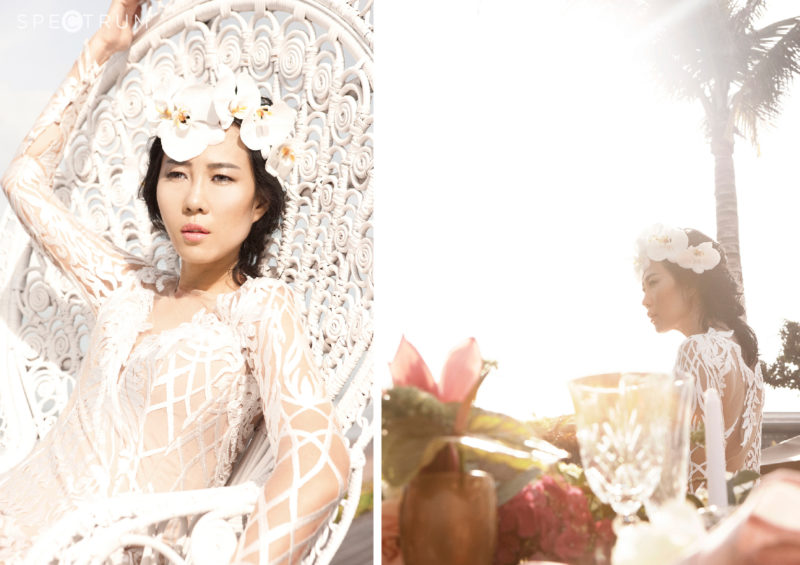
Pre-wedding shoot from one of the brides Cyrielle has worked with. Photo credit: Spectrum Agency.
Indoor weddings VS outdoor weddings: what are the new trends? Is the outdoor wedding being influenced by the West?
Mohara: We offer more and more outdoor weddings, either in China or abroad. We organize a limited number of weddings a year, as we want to ensure excellent customer service. About 80% of our weddings would be outdoor, or at least have the ceremony outdoor. We have seen lot of greenery inspired weddings (one of the biggest trends this year is a natural chic wedding with the Pantone color of the year being green). Chinese couples are looking at Pinterest a lot as well, which showcases mostly European or American weddings, and they want something similar.
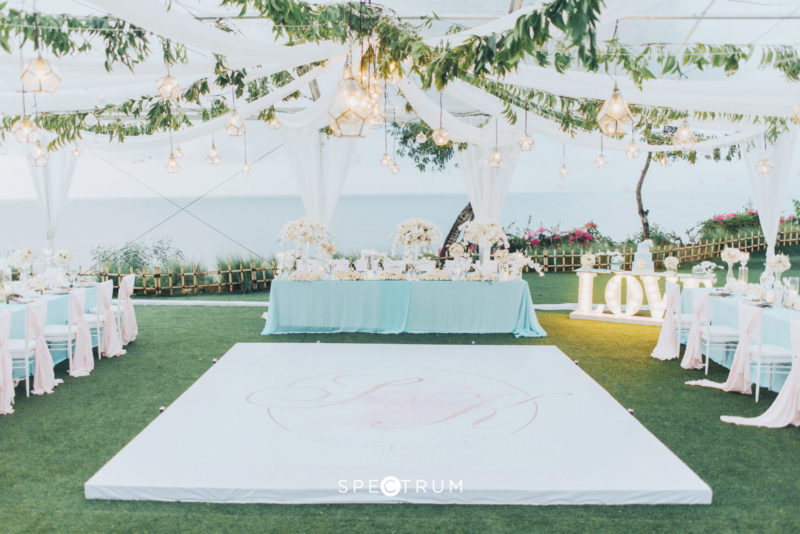
For tailor-made wedding services in Bali like this, Chinese couples are now willing to pay hundreds of thousands of yuan. Photo credit: Spectrum.
Do you plan to diversify or expand your services for the Chinese wedding industry?
Mohara: We are offering a full-service wedding planning, which means we cover everything from start to finish, including wedding styling, designs, planning, and management. We do have more requests for pre-wedding shooting abroad, and especially in France. Because of our expertise and partnerships with luxurious venues in France, we can offer a unique French experience to couples throughout the process.
Recent Sohu Data shows that 41% of couples find wedding planning firms online and 38% are introduced by friends, what are your thought on this? Also, how do you maintain your reputation online and offline?
Mohara: This seems pretty accurate, but for us, personal testimony and our work speak for themselves. Yes, we do have a website, as well as Weibo and WeChat (WeChat ID: SpectrumEvents). Weibo is definitely the most effective social media channel, which we use to post about our work on occasion. Sometimes get inquiries through these channels, but most are from introductions from friends.
The cost of marriage has increased 4,000 times in the last 30 years. In Guangzhou, it is estimated that a couple spends more than 400,000 yuan on a wedding on average. How much are people in Shanghai willing to spend on weddings? Is it more than in other cities? What are some of the biggest expenses?
Mohara: Budgets in Shanghai are higher than other cities. The costs of hotels, food, vendors are also higher in Shanghai than some second or tier cities. For some couples, food would be the most important so they would spend a lot on food & drinks. Others want to keep beautiful memories forever so they would choose a highly qualified photo & video team or even fly in a team they really like from abroad. For others, it will be all about flowers.
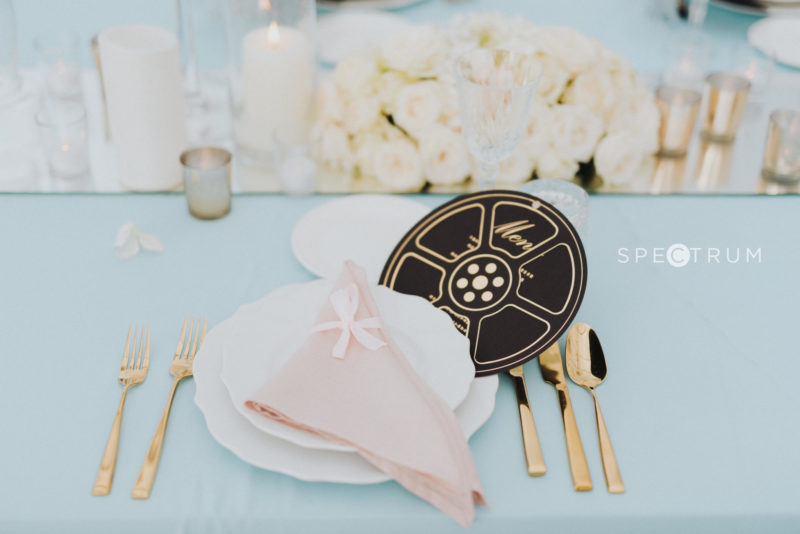
The cost of marriage in China has increased 4,000 times in the last 30 years. Photo credit: Spectrum.
There are now thousands of Chinese wedding planning companies in the mainland, especially in Tier 1 cities like Shanghai where you operate. What makes Spectrum different from other companies in the market?
Mohara: I think our vision and style are very different. Couples often choose us because they want a tasteful & elegant decor combined with a strong planning expertise. They are looking for a high-quality, fully bespoke wedding that matches their personalities and style. We help deliver that with our vast industry connections and multicultural team, which creates a serious logistics advantage.
[ctt template=”2″ link=”5NJ5u” via=”yes” ]Experts estimate the Chinese weddings industry will be worth 400 billion dollars by 2020.[/ctt]
Our style is also more European, we understand the real meaning of luxury and elegance, and this is what our clients are looking for. I believe it is an advantage to be a French wedding planner, as France is seen as a very romantic country in China, and we would bring a real French flair. Couples also will choose us because we are dedicated to our customers. For us, the details are critical, and this is what makes the difference for a luxury wedding.”
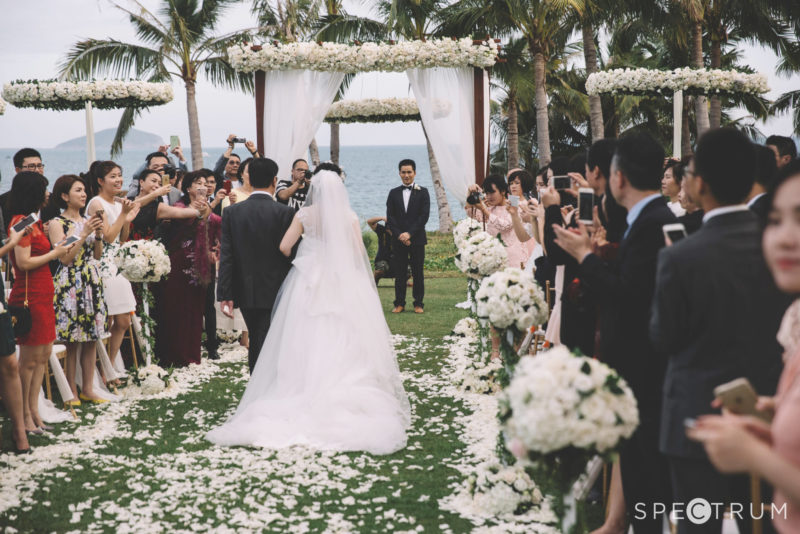
With Bali’s rising popularity with Chinese couples, locations like these are sure to be in high demand. Photo credit: Spectrum.
In the Chinese Wedding industry and other practices, our clients share our passion for results and success. For more on our expert insights and our work in the Chinese market, please see our site, follow our newsletter, or reach out to us to learn more.


![[Interview] Inside the new big business of Chinese weddings](../wp-content/uploads/2012/07/Main-visual.jpg)












